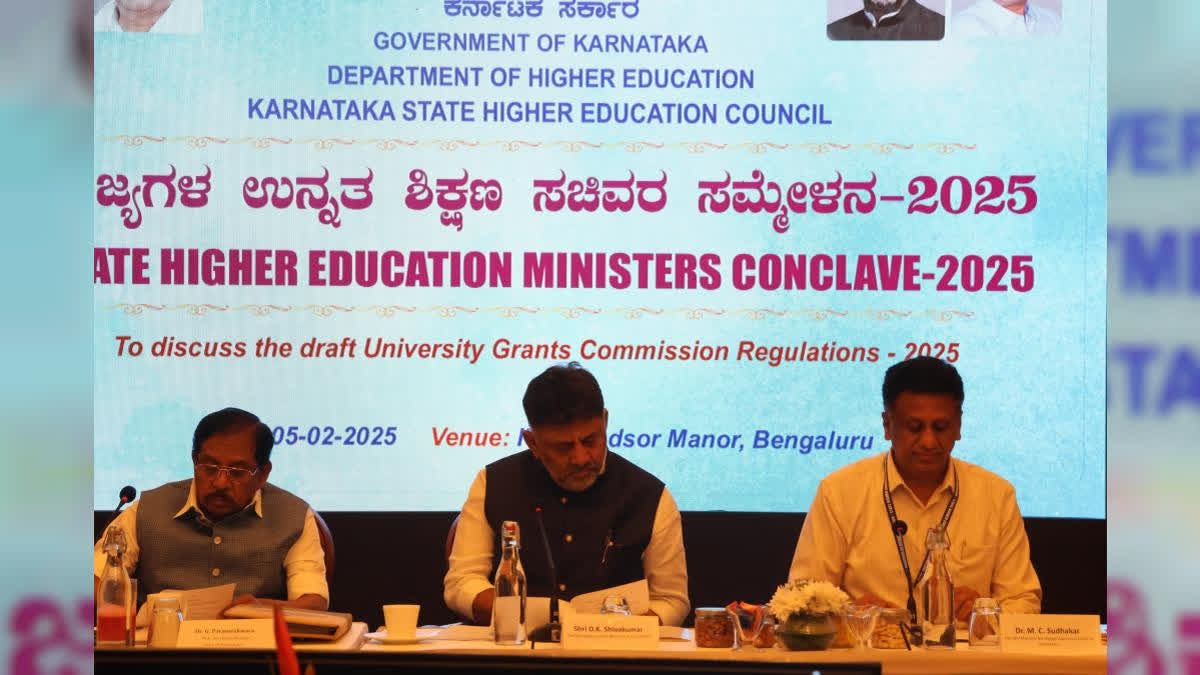Bengaluru: Higher Education Ministers of Karnataka, Tamil Nadu, Himachal Pradesh, Jharkhand, Telangana and Kerala on Wednesday passed a resolution opposing the University Grants Commission's (UGC) draft regulations2025 and urged the Centre to withdraw them forthwith.
The Government of Karnataka hosted a National Conclave bringing together Higher Education Ministers from six states to voice their opposition to the proposed University Grants Commission (UGC) Regulations 2025. The State Higher Education Ministers, throughout the day, deliberated extensively and outlined several key concerns regarding the draft UGC regulations, culminating in a joint resolution, signed by the Higher Education Ministers of six states.
Key Resolutions from the Conclave on UGC Draft Regulations 2025
The conclave raised serious concerns over the draft regulations for the appointment of Vice Chancellors in public universities. It noted that the regulations undermine the role of state governments in appointing Vice Chancellors for universities established under state acts, infringing on state rights within a federal structure.
Participants strongly opposed the proposed changes to the formation of search-cum-selection committees for Vice Chancellor appointments, arguing that they significantly curtail the rights of state governments. Additionally, the proposal allowing non-academic professionals to be appointed as Vice Chancellors was met with strong resistance. Concerns were also raised regarding the qualifications, tenure, and eligibility criteria for Vice Chancellors. The conclave emphasised that these requirements need serious reconsideration as they could negatively impact academic standards.
The removal of the Academic Performance Indicator (API) system in faculty evaluations and its replacement with a more discretionary method was deemed problematic. Attendees argued that this change could lead to inconsistencies in the evaluation process. Regarding faculty appointments, the conclave expressed apprehensions about the provision allowing candidates without a core subject degree to qualify for Assistant Professor positions. It also called for greater clarity on contractual faculty appointments, including guest faculty, visiting professors, professors of practice, and emeritus professors.
The proposed punitive measures for non-compliance with the regulations were criticised as excessive and undemocratic. Similarly, making provisions of the National Education Policy (NEP) mandatory and imposing penalties for non-compliance was described as a dictatorial move that violates state autonomy.
The conclave emphasised the need for stronger collaboration between universities and industries to foster innovation and research. It also pointed out that the draft regulations appear to favour private institutions at the expense of public universities, raising concerns about equitable access to quality education.
Another major point of contention was the mandatory entrance exams for undergraduate admissions. The conclave argued that this requirement could become a barrier to improving the Gross Enrollment Ratio (GER) and hinder efforts to make higher education more inclusive. Changes to the academic structure, including provisions on promotions, biannual examinations, fast-track degree programs, dual degrees, and multiple entry-exit options, were deemed to require further discussion before implementation.
In light of these concerns, the conclave called for the immediate withdrawal of the Draft UGC Regulations 2025. It urged the UGC to adopt a cooperative federal approach by engaging in discussions with state governments while framing policies, ensuring a balanced and inclusive higher education system.
Addressing the media persons, Karnataka Higher Education Minister MC Sudhakar said that the Joint Resolution would be submitted to the Ministry of Higher Education, Government of India urging for immediate withdrawal of the UGC Regulations.
The conclave underscored the collective resistance of state governments against the proposed UGC amendments, emphasising that higher education policies must align with regional needs and uphold the federal spirit of governance. The ministers reaffirmed their commitment to safeguarding state rights in shaping education policies and vowed to continue their efforts to ensure that the Centre engages in constructive dialogue on the matter.
Karnataka Deputy Chief Minister D.K. Shivakumar inaugurated the conclave and criticised the draft UGC regulations. He emphasised the need for states to collectively raise their voices, debate the issues, and exert pressure on the Centre to withdraw the amendments. Supporting this stance, Karnataka Home Minister G. Parameshwara argued that the regulations undermine regional languages, culture, and state autonomy, imposing centralised policies that contradict the principles of the Constitution.



